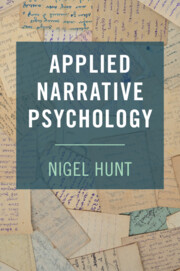Book contents
- Applied Narrative Psychology
- Applied Narrative Psychology
- Copyright page
- Contents
- Preface
- Chapter 1 Introduction
- Chapter 2 What Is Narrative?
- Chapter 3 Narratives in Psychology
- Chapter 4 Master Narratives
- Chapter 5 Narrative Methods
- Chapter 6 Life Interviews
- Chapter 7 Narrative Writing
- Chapter 8 Narrative Therapy
- Chapter 9 Narrative Exposure Therapy
- Chapter 10 Narrative Medicine
- Chapter 11 Narrative Health Psychology
- Chapter 12 Narrative Work Psychology
- Chapter 13 Narrative Coaching
- Chapter 14 Conclusion
- References
- Index
Chapter 3 - Narratives in Psychology
Published online by Cambridge University Press: 02 November 2023
- Applied Narrative Psychology
- Applied Narrative Psychology
- Copyright page
- Contents
- Preface
- Chapter 1 Introduction
- Chapter 2 What Is Narrative?
- Chapter 3 Narratives in Psychology
- Chapter 4 Master Narratives
- Chapter 5 Narrative Methods
- Chapter 6 Life Interviews
- Chapter 7 Narrative Writing
- Chapter 8 Narrative Therapy
- Chapter 9 Narrative Exposure Therapy
- Chapter 10 Narrative Medicine
- Chapter 11 Narrative Health Psychology
- Chapter 12 Narrative Work Psychology
- Chapter 13 Narrative Coaching
- Chapter 14 Conclusion
- References
- Index
Summary
This chapter focuses on the role of narrative in psychology, arguing that narrative is implicitly universal in psychology, is the basis of good science and should be used explicitly across the different areas of psychology, that is, it is the root metaphor of psychology (Sarbin, 1986). There is a brief exploration of narrative and neuroscience, and the evolution of narrative. There is also a focus on dominant narratives, reality and identity. Identity and narrative are closely related. There is a brief description of redemptive and contaminated narratives, and the relationship between narratives and memory construction. Some narratives are universal, and some are cultural, and we need to know how to make distinctions between these, as they help explain the fundamental nature of being human versus cultural constructions.
- Type
- Chapter
- Information
- Applied Narrative Psychology , pp. 22 - 41Publisher: Cambridge University PressPrint publication year: 2023

